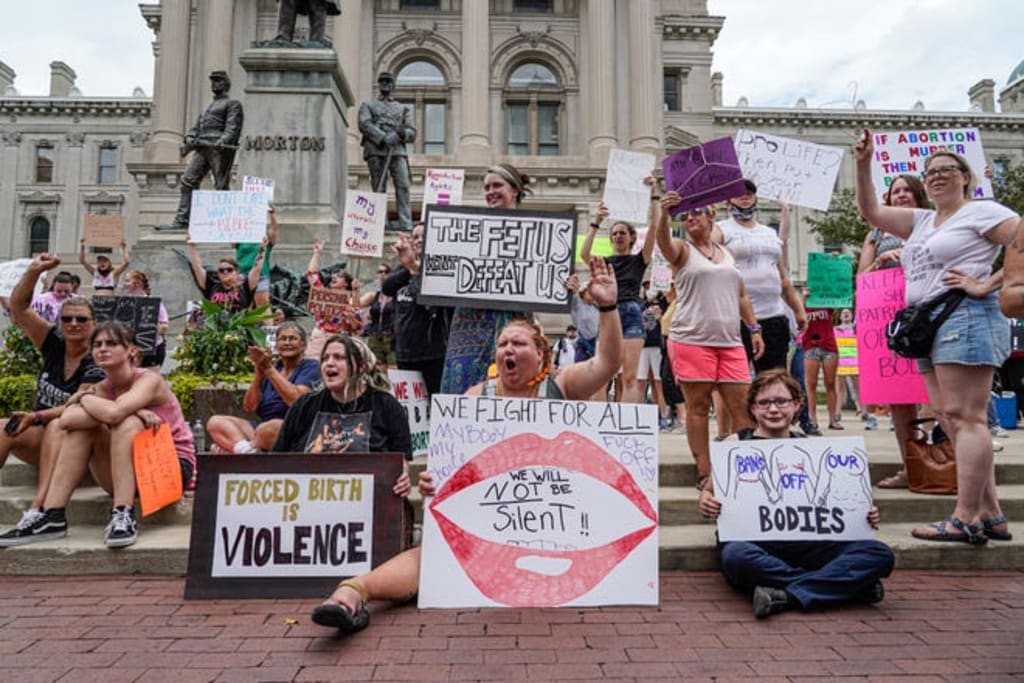Breaking Down Indiana's New Abortion Legislation
On September 15, 2022, Indiana will enact a near-total ban on abortion. Here is what you need to know.

In the wake of the Supreme Court’s decision in June to overturn the constitutional right to abortion, Americans across the nation have been protesting and eagerly awaiting the outcomes in their states regarding legal and accessible abortions and reproductive healthcare. Governor Eric Holcomb of Indiana, the state with the third-highest maternal mortality rate in the country, has just signed the new Senate Bill 1 (SB 1), almost totally banning abortions.
Starting on the fifteenth of September 2022, abortion will be illegal in Indiana, with exceptions in some cases of rape, incest, lethal fetal anomalies, or in certain cases when the life of the pregnant person is at risk. Any doctor who performs abortions outside the new legal parameters and any abortion-providing facility which is not a hospital or owned by a hospital will have their medical license revoked. This means that 501(c)(3) nonprofit organizations including Planned Parenthood, the nation’s largest sexual education provider and the leading reproductive and sexual health care provider, will no longer be licensed to provide healthcare and perform abortions, even for people who fall under the law’s exceptions.
Many Hoosiers seeking abortions will have to travel out of state, while others will have no other option but to carry their pregnancy to full term and give birth. Bordering states Illinois and Michigan are the closest alternatives for pregnant people living in Indiana who are able to travel in order to receive an abortion. Abortion is illegal in Kentucky and is only allowed in Ohio until fetal heart activity is detected, a result of Ohio's so-called "heartbeat law," which typically occurs around the six-week period of pregnancy.
Recently a case sparked international attention when a ten-year-old girl from Columbus, Ohio traveled to Indianapolis, Indiana for an abortion. Ohio’s ban on abortion does not have exceptions for rape or incest, and though some Ohio lawmakers claim the child would have fallen under the exception for cases when the pregnant person’s life is at risk, the pregnant little girl was turned away and denied an abortion in her home state. According to The Columbus Dispatch, the child’s Ohio doctor referred her to a doctor in Indianapolis, who reportedly determined the pregnancy to be at six weeks and three days, just over the cusp of the allotted time for an Ohio abortion.
With SB 1 coming into play next month, pregnant people in Indiana– as well as in Ohio, Kentucky, and other nearby states where abortion is limited or illegal– will be forced to travel elsewhere for their procedures. For thousands of Americans, the cost of travel paired with the cost of the procedure will be unsurmountable. The so-called “pro-life” legislation will lead to forced births across the state and throughout the midwest, increasing the already skyrocketing number of children in foster care and the amount of food insecure households, among countless other repercussions.
Though Indiana is not the only state to pass anti-abortion legislation, it is the first state to do so without having had trigger laws in place before the Supreme Court’s decision to strike down Roe v. Wade, the 1973 landmark decision that secured the constitutional right to abortion. In the wake of the overturning of Roe, about half of the states are anticipated to enact abortion bans or severe restrictions. Indiana will join the seventeen other states with active gestational limits and bans on abortions– full bans, six-week bans, or fifteen, eighteen, and twenty-week bans– and will allow a window of just ten weeks to obtain an abortion.
Indiana victims of rape and incest, or pregnant people who otherwise fit the exception for legal abortions, are the only people who may receive an abortion in the state; however they will only be permitted to have abortions up to the tenth week of pregnancy. After ten weeks, even the people who qualify for a legal Indiana abortion will have to travel elsewhere for the procedure.
The only way SB 1 will not come into effect is if legislation to block the ban is successfully proposed; but with the September date creeping closer and no known plan of Democrats to repeal the law, SB 1 is likely to come to fruition.
Todd Huston, Indiana house speaker, responded to the backlash of SB 1 by stating that anyone who is upset about the legislation should simply vote for new lawmakers. Indy Star reported Governor Eric Holcomb’s following statement:
“Following the overturning of Roe, I stated clearly that I would be willing to support legislation that made progress in protecting life… [SB 1] accomplishes this goal following its passage in both chambers of the Indiana General Assembly with a solid majority of support."
While some anti-abortionists in Indiana have praised the new legislation, most Hoosiers are in favor of accessible abortions, according to The Guardian. Governor Holcomb’s forced-birth stance comes at the expense of Indiana residents who are able to become pregnant as well as Ohioans, Kentuckians, and others who will no longer be able to travel to Indiana for a legal and safe abortion.
Ironically, the governor’s apparent belief in the sanctity of life does not necessarily apply to people living outside of the womb. Earlier this year, Governor Holcomb repealed the law requiring a permit to carry a firearm. The so-called “constitutional carry” law means almost any person in Indiana who is 18 years or older can carry a gun without ever having received a background check, and there will no longer be any sure way for police officers to know if a person stopped in traffic is carrying a gun legally.
While some Republicans such as the House sponsor of SB 1, Rep. Wendy McNamara (R-Evansville), are now hailing Indiana as "the most pro-life state," Democrats like Rep. Maureen Bauer (D-South Bend) do not believe there is anything "pro-life" at all about antiabortion legislation. In her speech on the House floor, Rep. Bauer had this to say:
"Indiana's going to force women and girls to give birth when 50 percent of our state is a child care desert. Forced birth in the only wealthy nation that does not provide paid family medical leave. Forced birth in a nation where Black moms face higher rates of death from pregnancy and childbirth. Forced birth where we average one mass shooting per day and have no universal health care or universal child care."
Beginning on September 15th, abortion clinics and other non-hospital reproductive healthcare providers will be stripped of their medical licenses, and pregnant people who qualify for legal abortions will have just ten weeks from the point of conception to receive treatment. It is important to note that anyone seeking an abortion in Indiana will not be criminally charged for doing so, while anyone who provides an abortion will be under threat of prison time and fines. It is still legal in all fifty states to travel to another state to obtain a legal abortion.
To learn about abortion access in your state, visit abortionfinder.org.
Articles consulted for this piece include: "Suspect indicted in rape of 10-year-old Columbus girl who got Indiana abortion" from The Columbus Dispatch; "Large employers express opposition after Indiana approves abortion ban" from NPR; "Tracking the States Where Abortion Is Now Banned" from The New York Times; "Indiana adopts near-total abortion ban as governor signs SB 1 into law" from Indy Star; "Indiana becomes first US state post-Roe to ban most abortions" from The Guardian; "Gov. Holcomb signs bill eliminating permit requirement to carry handguns in Indiana" from Indy Star; "Indiana's near-total abortion ban is now law, takes effect Sept. 15" from WFYI
About the Creator
Abi Jo Shoaff
she/her
I write about what excites me.
I'm also a shameless literature and music nerd, hoarder and annotator of books, and proud lesbian mom to five adorable pets– and I'm an aspiring poet, essayist, and storyteller.
Thanks for reading.






Comments
There are no comments for this story
Be the first to respond and start the conversation.